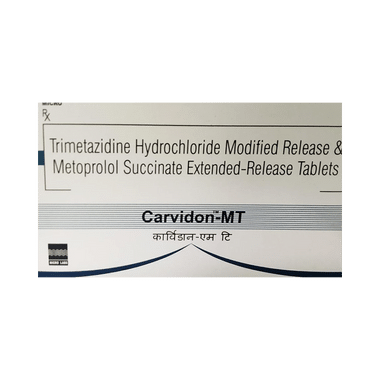All Details About Carvidon-MT Tablet ER
Find out detailed description, uses, directions of use, side effects, warnings and precautions, frequently asked questions about Carvidon-MT Tablet ER
Description:
Carvidon-MT Tablet ER is a combination medicine used for treating heart-related chest pain (angina). It prevents new attacks of angina but does not stop an acute attack once it has started. It can be used alone or in combination with some other medicines.Carvidon-MT Tablet ER should be taken regularly as advised by the doctor. You should take it with or without food and at a fixed time. Your doctor will decide how often you should take this medicine. This may change from time to time depending on how well it is working. You should take this medicine regularly to get the most benefit, even if you feel fine.
It helps in preventing future harm. If you stop taking it, your chest pain may come back. You can improve the health of your heart by making some lifestyle changes such as quitting smoking, cutting down on alcohol, eating well, taking regular exercise, and managing stress.
Some common side effects of this medicine include dizziness, headache, abdominal pain, diarrhea, indigestion, nausea, vomiting, rash, itching, hives, and weakness. Communicate to your doctor if these effects bother you or do not go away.
This medicine may not be suitable for some people. You must inform the doctor if you are suffering from any liver or kidney disease. Also, let your doctor know if you are pregnant or breastfeeding and about all the other medications that you are taking regularly.
Directions For Use:
Ordinary side effects of Carvidon-MT
- Dizziness
- Headache
- Nausea
- Vomiting
- Weakness
- Abdominal pain
- Indigestion
- Itching
- Diarrhea
- Hives
- Slow heart rate
- Pantingness
Side Effects:
Most side effects do not require any medical attention and disappear as your body adjusts to the medicine. Consult your doctor if they persist or if you’re worried about themWarning & Precautions:
Alcohol
CONSULT YOUR DOCTOR
It is not known whether it is safe to consume alcohol with Carvidon-MT Tablet ER. Please consult your doctor.
Pregnancy
CONSULT YOUR DOCTOR
Information regarding the use of Carvidon-MT Tablet ER during pregnancy is not available. Please consult your doctor.
Breast feeding
CONSULT YOUR DOCTOR
Information regarding the use of Carvidon-MT Tablet ER during breastfeeding is not available. Please consult your doctor.
Driving
CONSULT YOUR DOCTOR
It is not known whether Carvidon-MT Tablet ER alters the ability to drive. Do not drive if you experience any symptoms that affect your ability to concentrate and react.
Kidney
CONSULT YOUR DOCTOR
There is limited information available on the use of Carvidon-MT Tablet ER in patients with kidney disease. Please consult your doctor.
Liver
CONSULT YOUR DOCTOR
There is limited information available on the use of Carvidon-MT Tablet ER in patients with liver disease. Please consult your doctor.
FAQs:
Q. Does taking Carvidon-MT Tablet ER increase the risk of falling down frequently?
Though it is rare, falls may occur with the use of Carvidon-MT Tablet ER. This may be due to the instability while walking or a fall in blood pressure while standing up. The risk may be higher in elderly patients. Therefore, they need to be more careful and should be monitored.
Q. How should Carvidon-MT Tablet ER be taken?
You should take Carvidon-MT Tablet ER exactly as prescribed by your doctor. It is meant for oral use. So, take the tablets with sufficient amount of liquid, e.g., a glass of water. You can take this medicine with or without food.
Q. What is angina or heart-related chest pain?
Angina is a recurring pain or discomfort in the chest that happens when some part of the heart does not receive enough blood. It occurs when blood vessels that carry blood to the heart become narrow and blocked due to atherosclerosis (build-up of fat and cholesterol), and is a common symptom of heart disease. Angina feels like a pressing or squeezing pain, usually in the chest, but sometimes may be felt in the shoulders, arms, neck, jaws, or back.
Q. What triggers angina?
Angina or chest pain can occur when the heart’s need for oxygen increases beyond the oxygen available from the blood. Physical exertion is the most common trigger for angina. Other triggers can be emotional stress, extreme cold or heat, heavy meals, alcohol, and cigarette smoking.
Disclaimer:
Getomeds primary intention is to ensure that its consumers get information that is reviewed by experts, accurate, and trustworthy. The information and contents of this website are for informational purposes only. They are not intended to be a substitute for professional medical advice, diagnosis, or treatment. Please seek the advice of your doctor and discuss all of your concerns about any disease or medication. Do not disregard or postpone seeking professional medical advice because of something you read on Getomeds. Our mission is to support, not replace, the doctor-patient relationship.
Recommended Substitute
GetOmeds
